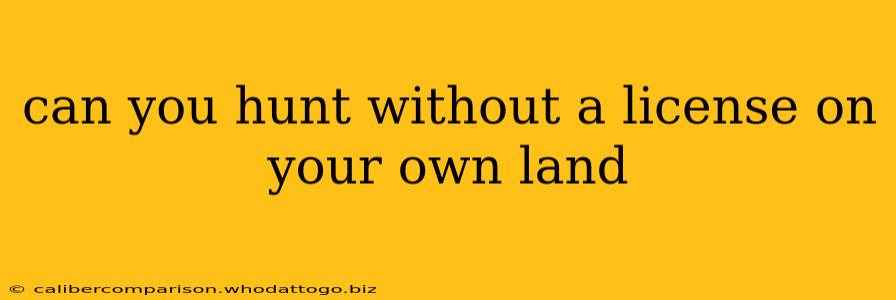Can You Hunt Without a License on Your Own Land? The Complexities of Property Rights and Hunting Regulations
The question of whether you can hunt without a license on your own land is a common one, but the answer isn't a simple yes or no. While it might seem intuitive that you have complete control over what happens on your property, hunting regulations are complex and vary significantly by state and even sometimes by county. This article will delve into the nuances of this issue, exploring the legal frameworks and considerations that impact your right to hunt on your own land without a license.
State-Specific Laws: The Foundation of Hunting Regulations
The most crucial factor determining whether you can hunt without a license on your own land is your state's specific hunting regulations. There is no federal law dictating this; it's entirely up to individual states to establish their own rules. Many states require a hunting license regardless of land ownership, aiming to:
- Manage Wildlife Populations: Licenses help control the number of animals harvested, preventing overhunting and ensuring the long-term health of wildlife populations.
- Generate Revenue for Conservation: License fees often fund vital conservation efforts, habitat preservation, and wildlife management programs.
- Track Hunting Activity: Licensing provides data on hunting activity, aiding in the effective management of wildlife resources.
Exceptions and Potential Loopholes (Proceed with Caution!)
While the general rule is that a license is usually required, some states might have exceptions or circumstances under which hunting without a license on private land is permitted. These exceptions are often narrow and highly specific, potentially including:
- Specific Wildlife Species: Some states may allow hunting of certain nuisance animals (like feral hogs or certain bird species causing crop damage) without a license, but this typically requires reporting the harvest and often involves specific permits or authorizations.
- Specific Land Use: Certain agricultural practices might allow for the control of wildlife damaging crops, without requiring a hunting license. However, these instances are very strictly defined and regulated.
- Traditional Subsistence Hunting: In some remote areas, traditional indigenous hunting practices might be exempted from standard licensing requirements. This, however, is exceptionally rare and heavily dependent on established tribal rights and state recognition.
The Importance of Checking Your State's Regulations
It is absolutely crucial to consult your state's wildlife agency website or relevant hunting regulations document before hunting on your property, even if you believe you fall under an exception. Failing to comply with hunting laws can result in significant fines, the confiscation of hunting equipment, and even criminal charges.
Beyond the License: Other Legal Considerations
Even with a license, hunting on your land might still be subject to other regulations, including:
- Hunting Seasons: Specific hunting seasons exist for different game animals. Hunting outside these designated periods is illegal, regardless of land ownership.
- Methods and Equipment: Restrictions exist on the types of weapons, hunting methods (e.g., baiting, use of dogs), and the number of animals you can harvest.
- Property Boundaries: Ensure you fully understand your property boundaries to avoid accidentally hunting on neighboring land, which would be a serious offense.
Conclusion: Know Before You Hunt
Hunting on your own land without a license is a risky endeavor with potentially severe legal consequences. The prevailing rule is that a license is required, regardless of land ownership. While some narrow exceptions may exist, it's essential to thoroughly research and understand your state's specific hunting regulations before engaging in any hunting activity. Always err on the side of caution and obtain the necessary permits and licenses to avoid legal trouble and ensure responsible wildlife management. Contact your state's wildlife agency for the most up-to-date and accurate information.

